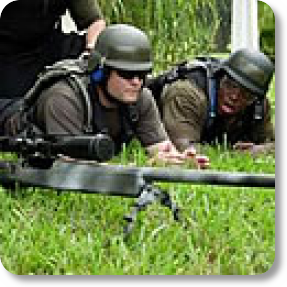
After more than four hours wearing a gas mask -- running, doing sit-ups and pushups and practicing shooting -- Charlie Newman wasn't sure he was going to be able to finish a three-week SWAT training program in Miami.
"It's like breathing through a straw and the hot Miami heat -- I thought, 'This is madness,' " Newman said.
But Newman, 37, pushed through that exercise and many others to be one of only eight people to complete a rigorous training program used to select members of the Miami-Dade Police Department's special response team. Forty-seven people started the program.
Newman's training will now benefit the Louisville Metro Police SWAT team, which is made up of 34 members who are part-time. "What he learns, he can bring back and give to his supervisors and they can in turn give it to the other members," Police Chief Robert White said.
Earlier this month, White presented an award to Newman, who has been an officer since 1998. White praised the SWAT team for its performance during difficult and dangerous tasks, while honoring Newman for his desire to take his training beyond what is required.
Newman went to Florida in late October thanks to a partnership that has developed between the part-time Louisville SWAT team and its full-time, nationally recognized Miami counterpart. He volunteered to go to the program, in which only one other non-Miami officer participated."It's the pinnacle of my law enforcement career to complete that training," said Newman, who has been a Louisville SWAT officer for seven years. "It made me a stronger person. It gave me a true respect for what SWAT is."SWAT officers respond to high-risk incidents, often those involving barricaded suspects or hostage situations. They average about 10 to 12 of those incidents a year.
Such a case involved Gary Goodman, who held SWAT officers at bay for more than 18 hours after he shot and killed his estranged wife, Paula Goodman, in August 2005. After trying to negotiate with Goodman all day, the SWAT members caught him as he tried to run from his home in Pleasure Ridge Park.
The team also backs up officers who are serving warrants to suspects considered to be potentially armed or dangerous, which they do about 15 to 20 times a year.
The members of the Louisville team have other assignments throughout the police department. They operate on an on-call basis. Newman works in narcotics.
Officers assigned to SWAT have specialty training two days a month, but access to the Miami program gives the officers a chance to hone their skills.
Newman said he didn't expect it to be as tough as it was.
"I had no idea that this school was going to be like some special operations camp," he said. "They really put you under the gantlet of stress."
Participants swam in combat boots and fatigues. They ran several miles a day -- sometimes in the sugar-like sand of South Beach. On Halloween, commanders made them do 400 sit-ups -- an exercise that took two hours and rubbed a raw spot on Newman's back.
"It's the mental stress of failure plus the total physical exhaustion that they put you through," Newman said.
That's exactly what Miami trainers want.
"What we're trying to do is re-create the stress of the operational condition," said Lt. Ed Caneva, who is in charge of training for the Miami-Dade team.
Caneva and Lt. Tony Cobaugh, one of the metro SWAT commanders, met at a training conference in March 2005. That led to Cobaugh inviting officers from Miami to Louisville last March to conduct a weeklong training program.
Miami officers subsequently invited a Louisville officer to come to Miami for their three-week session.
Newman accepted. Cobaugh said the Louisville team learned from Newman's experience that its members can perform at a top-notch level, even when put with elite full-time counterparts.
Working with the Miami team has also changed the way the metro SWAT team handles certain things.
For example, Cobaugh said the team now uses more people to enter a high-risk building. They've also started putting one person in charge of knowing the location and job of each officer on a scene. That makes for better safety and accountability in case things turn chaotic, Cobaugh said.
Caneva, the Miami officer, said the partnership helps both departments.
"We're humble enough to understand that we have learned from other teams," he said.
Caneva said the Miami team hopes to begin a regular program that will train at Fort Knox and partner with metro police.
"It's a win-win on both sides if this partnership continues," Caneva said.







